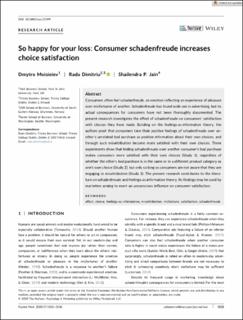| dc.contributor.author | Moisieiev, Dmytro | |
| dc.contributor.author | Dimitriu, Radu | |
| dc.contributor.author | Jain, Shailendra P. | |
| dc.date.accessioned | 2021-05-10T12:17:26Z | |
| dc.date.available | 2021-05-10T12:17:26Z | |
| dc.date.created | 2020-11-23T16:05:24Z | |
| dc.date.issued | 2020 | |
| dc.identifier.citation | Moisieiev, D., Dimitriu, R., & Jain, S. P. (2020). So happy for your loss: Consumer schadenfreude increases choice satisfaction. Psychology & Marketing, 37(11). | en_US |
| dc.identifier.issn | 0742-6046 | |
| dc.identifier.uri | https://hdl.handle.net/11250/2754680 | |
| dc.description.abstract | Consumers often feel schadenfreude, an emotion reflecting an experience of pleasure over misfortunes of another. Schadenfreude has found wide use in advertising, but its actual consequences for consumers have not been thoroughly documented. The present research investigates the effect of schadenfreude on consumers' satisfaction with choices they have made. Building on the feelings‐as‐information theory, the authors posit that consumers take their positive feelings of schadenfreude over another's unrelated bad purchase as positive information about their own choices, and through such misattribution become more satisfied with their own choices. Three experiments show that feeling schadenfreude over another consumer's bad purchase makes consumers more satisfied with their own choices (Study 1), regardless of whether the other's bad purchase is in the same or in a different product category as one's own choice (Study 2), but only so long as consumers are not aware that they are engaging in misattribution (Study 3). The present research contributes to the literature on schadenfreude and feelings‐as‐information theory. Its findings may be used by marketers aiming to exert an unconscious influence on consumer satisfaction. | en_US |
| dc.language.iso | eng | en_US |
| dc.rights | Attribution-NonCommercial-NoDerivatives 4.0 Internasjonal | * |
| dc.rights.uri | http://creativecommons.org/licenses/by-nc-nd/4.0/deed.no | * |
| dc.title | So happy for your loss: Consumer schadenfreude increases choice satisfaction | en_US |
| dc.type | Peer reviewed | en_US |
| dc.type | Journal article | en_US |
| dc.description.version | publishedVersion | en_US |
| dc.rights.holder | © The Author(s) 2020. | en_US |
| dc.source.volume | 37 | en_US |
| dc.source.journal | Psychology & Marketing | en_US |
| dc.source.issue | 11 | en_US |
| dc.identifier.doi | https://doi.org/10.1002/mar.21399 | |
| dc.identifier.cristin | 1851209 | |
| cristin.ispublished | true | |
| cristin.fulltext | original | |
| cristin.qualitycode | 1 | |

